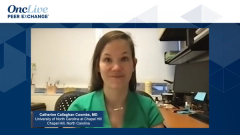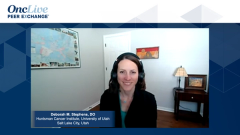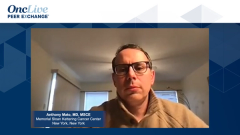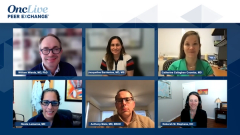
Implications for Zanubrutinib as CLL Treatment
An overview of safety and efficacy data for a third-generation Bruton tyrosine kinase inhibitor, zanubrutinib, as treatment for patients with chronic lymphocytic leukemia.
Episodes in this series

William Wierda, MD, PhD: In terms of another agent that’s available also among the irreversible inhibitors of BTK [Bruton tyrosine kinase] is a drug that’s approved not for CLL [chronic lymphocytic leukemia] yet but for mantle cell [lymphoma]. Maybe, Debbie, you can enlighten us on zanubrutinib [Brukinsa®]? And we did see an update at ASH [American Society of Hematology annual meeting 2021]. Two abstracts were presented at ASH regarding the SEQUOIA trial, which was a frontline trial with zanubrutinib. Can you highlight for us some of the features of zanubrutinib that distinguished it from ibrutinib [Imbruvica®] and perhaps acalabrutinib [Calquence®]? Is it a drug that you’re considering in use for treatment of your patients with CLL, and if so, who might those patients be?
Deborah M. Stephens, DO: Yes. And, as you mentioned, this is another second-generation BTK inhibitor that was being developed about the same time as acalabrutinib. And they do have some similar features in that both drugs have now had head-to-head studies against ibrutinib showing that the efficacy of the drugs is at least similar, maybe better, and the drugs are less toxic especially in terms of these adverse effects that keep coming up—the cardiac adverse effects, atrial fibrillation, hypertension.
One thing that’s different with zanubrutinib than say compared to acalabrutinib, Dr Coombs mentioned the headache. I don’t typically see that with zanubrutinib. A lot of the studies show that zanubrutinib has a higher rate of neutropenia. However, most of the studies, they don’t see a difference in terms of febrile neutropenia. Maybe clinically significant neutropenia is not apparent as a difference for this drug. We’re seeing more and more data come out about this drug. At the European Hematology Association, we saw about a 3-year follow-up of just a single-agent study in the relapsed setting, just showing continued benefit in terms of efficacy, low numbers of discontinuations due to toxicity because the drug is tolerated very well.
And then at ASH 2021, we saw some updates of the SEQUOIA study, which is a large study with multiple different study arms. One of the study arms that was presented was a frontline. It was zanubrutinib single agent versus 6 cycles of bendamustine [Treanda®] and rituximab [Rituxan®]. And this arm specifically was for patients without deletion [del](17) because there was a different study arm with del(17p) patients in it. But, for this part of the study, the primary end point was progression-free survival [PFS] and there was a median follow-up of about 2 years, which is still a short follow-up in CLL studies. However, even in that short time frame, they could see the zanubrutinib significantly prolonged the progression-free survival over bendamustine and rituximab in these treatment-naїve patients. Toxicity profiles in the study were as expected that we’ve seen and discussed already. It was notable, there’s a low rate of discontinuation of zanubrutinib. Just about 8% of patients discontinued due to toxicity and 14% discontinued in the BR [bendamustine, rituximab] arm.
I mentioned there’s also another study, it’s a single or a different arm of this study is just single agent for del(17p) patients, and that is also continuing to show nice data in a typically very high-risk population where ibrutinib and acalabrutinib don’t have a lot of data in these frontline del(17p) patients. All arms of the study are providing clear base of data that could be used as a submission to the FDA [Food and Drug Administration] for approval of this drug in CLL where it’s already approved in mantle cell lymphoma. This drug is already included in the NCCN [National Comprehensive Cancer Network] guidelines if patients can’t tolerate both ibrutinib and acalabrutinib. It’s a great drug, and it will give us more choices in this patient population and continued follow-up of these studies is important to pay attention to.
Transcript edited for clarity.






































